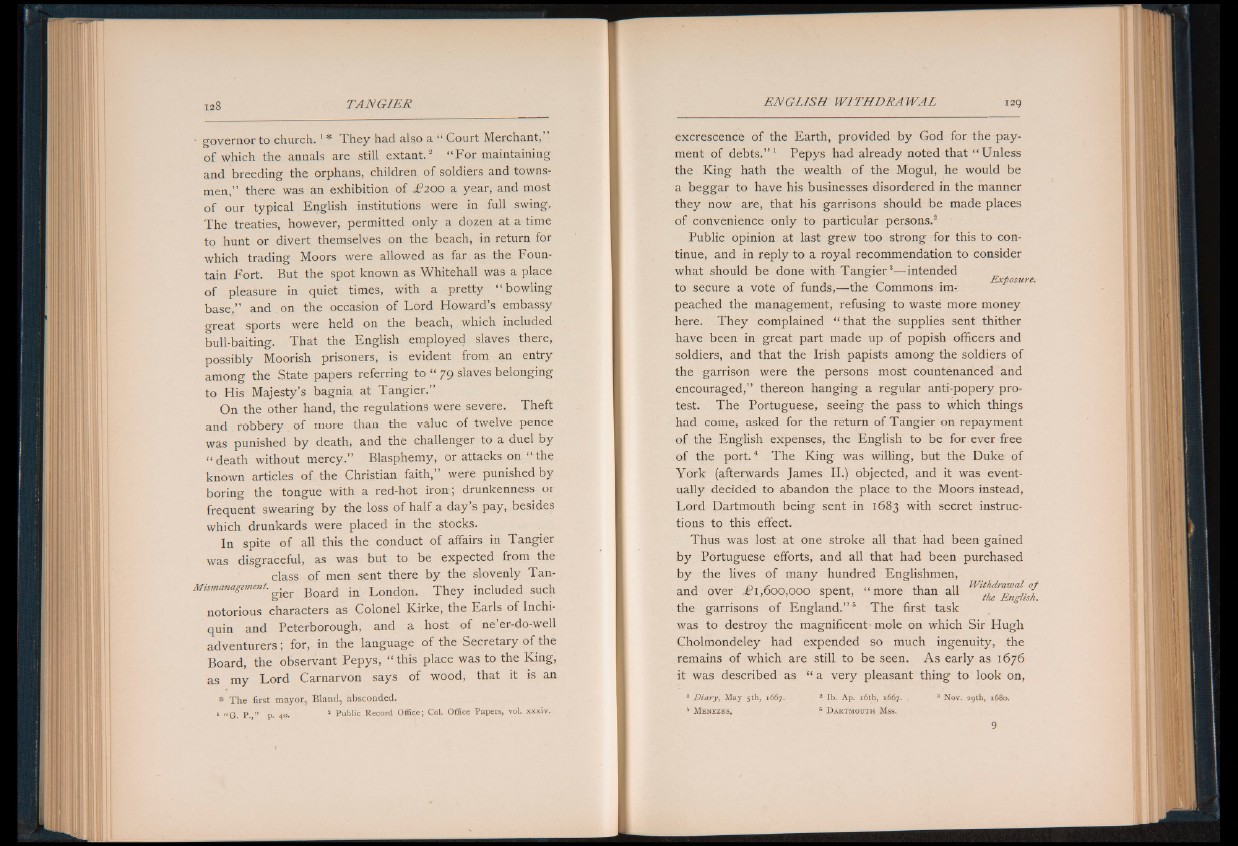
governor to church.1 * They had also a “ Court Merchant,
of which the annals are still extant.2 “ For maintaining
and breeding the orphans, children of soldiers and townsmen,”
there was an exhibition of i?200 a year, and most
o f our typical English institutions were in full swing.
The treaties, however, permitted only a dozen at a time
to hunt or divert themselves on the beach, in return for
which trading Moors were allowed as far as the Fountain
Fort. But the spot known as Whitehall was a place
of pleasure in quiet times, with a pretty “ bowling
base,” and on the occasion of Lord Howard’s embassy
great sports were held on the beach, which included
bull-baiting. That the English employed slaves there,
possibly Moorish prisoners, is evident from an entry
among the State papers referring to “ 79 slaves belonging
to His Majesty’s bagnia at Tangier.”
On the other hand, the regulations were severe. Theft
and robbery of more than the value of twelve pence
was punished b y death, and the challenger to a duel by
“ death without mercy.” Blasphemy, or attacks on “ the
known articles o f the Christian faith,” were punished by
boring the tongue with a red-hot iron ; drunkenness or
frequent swearing by the loss of half a day’s pay, besides
which drunkards were placed in the stocks.
In spite o f all this the conduct o f affairs in Tangier
was disgraceful, as was but to be expected from the
class of men sent there by the slovenly Tam
M isman ag emen t. ^ g 0ard in London. They included such
notorious characters as Colonel Kirke, the Earls of Inchi-
quin and Peterborough, and a host of ne’er-do-well
adventurers; for, in the language o f the Secretary o f the
Board, the observant Pepys, “ this place was to the King,
as my Lord Carnarvon says of wood, that it is an
* The first mayor, Bland, absconded.
1 „Q P » p. 4o, 2 Public Record Office; Col. Office Papers, vol. xxxiv.
excrescence of the Earth, provided by God for the payment
of debts.” 1 Pepys had already noted that “ Unless
the King hath the wealth of the Mogul, he would be
a beggar to have his businesses disordered in the manner
they now are, that his garrisons should be made places
of convenience only to particular persons.2
Public opinion at last grew too strong for this to continue,
and in reply to a royal recommendation to consider
what should be done with Tangier3—untended
r r , , „ . Exposure.
to secure a vote of funds,— the Commons impeached
the management, refusing to waste more money
here. They complained “ that the supplies sent thither
have been in great part made up of popish officers and
soldiers, and that the Irish papists among the soldiers of
the garrison were the persons most countenanced and
encouraged,” thereon hanging a regular anti-popery protest.
The Portuguese, seeing the pass to which things
had come, asked for the return of Tangier on repayment
of the English expenses, the English to be for ever free
of the port.4 The King was willing, but the Duke of
York (afterwards James II.) objected, and it was eventually
decided to abandon the place to the Moors instead,
Lord Dartmouth being sent in 1683 with secret instructions
to this effect.
Thus was lost at one stroke all that had been gained
by Portuguese efforts, and all that had been purchased
by the lives of many hundred Englishmen,
and over ¿f? 1,600,000 spent, “ more than all
the garrisons o f England.” 5 The first task
was to destroy the magnificent mole on which Sir Hugh
Cholmondeley had expended so much ingenuity, the
remains of which are still to be seen. A s early as 1676
it was described as “ a very pleasant thing to look on,
1 Diary, May 5th, 1667. 2 lb. Ap. 16th, 1667. 3 Nov. 29th, 1680.
* M e n e z e s . 5 D a r t m o u t h M s s .